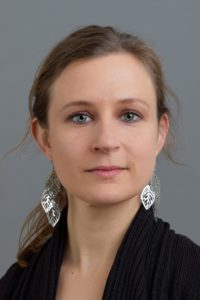 Since her state examination as a veterinarian at the University of Bern, Simone Niederhäuser has been ambitious. She started as an intern in a veterinary clinic and progressed to a specialist in small animal surgery with an ECVS diploma. She is currently working at the animal clinic Thun Süd. In her free time, she spends time volunteering and walking her dog, Nacho.
Since her state examination as a veterinarian at the University of Bern, Simone Niederhäuser has been ambitious. She started as an intern in a veterinary clinic and progressed to a specialist in small animal surgery with an ECVS diploma. She is currently working at the animal clinic Thun Süd. In her free time, she spends time volunteering and walking her dog, Nacho.
Click below to read her interview!
You completed your doctoral dissertation at the Institute of Veterinary Virology. What caused you to specialize in small animal surgery after studying virology?
My focus has always been on surgery, but virology has always fascinated me and my lecturer had an opening for a PhD student available. I am glad that I worked in a paraclinical subject for my dissertation. My time as a doctoral student was a lot of fun.
Surgeons, especially orthopedic surgeons, are predominately male. How has your experience been as a woman in the field?
There are many women in veterinary medicine, and I have never had the feeling of being treated differently because of my gender. Let’s be happy about that!
What do you like about surgery?
I find biology miraculous. I enjoy the challenge of finding a solution to the problem at hand, and the quiet and concentrated work of surgery. The craftsmanship inspires me – I like the fine work of soft tissue reconstruction, but I also like picking up a screwdriver to repair a fracture.
You’re certified by the European College of Veterinary Surgeons, which speaks not only to your surgical abilities but also to your commitment to education. You actively support and promote ECVS – why is this important to you?
The sum of knowledge and experience in a community is much greater than the expertise of any individual. Our clients benefit from the collective intelligence of ECVS. The organization is a highly organized and well-run team, which means we can work together to more accurately diagnose clinical cases (especially rare or complex cases) and therefore better advise pet owners on appropriate therapy. Because ECVS is a community of experts that collaborate with one another, each one of us can focus on what we do best.
KYON works with you and many other ECVS diplomats. How do you like our products and services, and how could we help you even more in your challenging work?
KYON offers many practical courses with very good wetlabs and strives to continuously improve the surgical instruments in favor of intraoperative handling. Regular information on specific updates, like this newsletter, would be ideal. A platform for pet owners would also be welcome.
You’ve helped stray dogs working with CLAW in South Africa. What was it like to volunteer there?
The majority are dogs we worked with belonged to destitute families. I was a little nervous when I first drove to Durban Deep. I had almost no idea what to expect. However, from day one, I found CLAW to be a little oasis of friendliness and helpfulness. The living conditions of the people in the townships around Durban Deep are catastrophic. Most of the animals there require medical care, and without CLAW this care would be nearly inaccessible. The community there loves their dogs as much as we do!
Can you tell us a story from your work with CLAW?
During my second trip, there was a group of young, stray cats that lived around the hospital. One of them would routinely sneak into the operating room to sleep next to our patients’ heads while they were in surgery – anesthesia monitoring of a different kind!
Where do you see yourself in 10 years?
Where exactly I will be, I do not know yet, but I will probably be performing surgery. The patient will almost certainly have fur and four paws. At the moment, I am focused on constantly improving my surgical skills. I would love to help to train new residents later on in my career.
